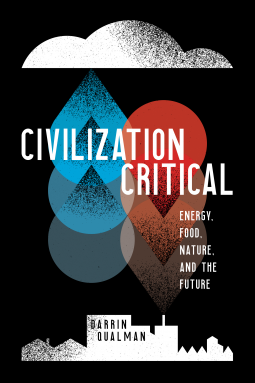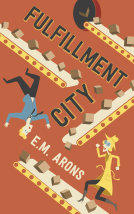
Civilization Critical
Energy, Food, Nature, and the Future
by Darrin Qualman
This title was previously available on NetGalley and is now archived.
Send NetGalley books directly to your Kindle or Kindle app
1
To read on a Kindle or Kindle app, please add kindle@netgalley.com as an approved email address to receive files in your Amazon account. Click here for step-by-step instructions.
2
Also find your Kindle email address within your Amazon account, and enter it here.
Pub Date Apr 01 2019 | Archive Date Jun 05 2019
Talking about this book? Use #CivilizationCritical #NetGalley. More hashtag tips!
Description
The modern world is wondrous. Its factories produce ten thousand cars every hour and ten trillion transistors every second. We carry supercomputers in our pockets, and nearly a million people are in the air at any time. In Civilization Critical, Darrin Qualman takes readers on a tour of the wonders of the 21st century.
But the great strength of our modern word is also its great weakness. Our immense powers to turn resources and nature into products and waste imperil our future. And plans to double and redouble the size of the global economy veto sustainability.
So, is our civilization doomed? No. Doom is a choice. We can make different choices.
Qualman demonstrates that a 19th- and 20th-century transition to linear systems and away from the circular patterns of nature (and of all previous civilizations) is the foundational error—the underlying problem, the root cause of climate change, resource depletion, ocean’s full of plastics, and a host of mega-problems now intensifying and merging, with potentially civilization-cracking results. In this sweeping work, Qualman reinterprets and re-explains the problems we face today, and charts a clear, hopeful path into the future.
Advance Praise
"A thoughtful and thoroughly documented analysis of the runaway train we are all aboard. Anyone worried about the track ahead should read it. Those not worried should read it more than once."
— Ronald Wright, author of A Short History of Progress
"Why is the Amazon rainforest shrinking, while Amazon.com is growing rapidly? You will find that and other answers in this masterful book by Darrin Qualman, who takes us for a intriguing ride along the history of energy, materials and the living world, ending with a call for the transformation of our civilization."
— Wolfgang Sachs, author of The Development Dictionary, and Planet Dialectics
Available Editions
| EDITION | Other Format |
| ISBN | 9781773630861 |
| PRICE | CA$25.00 (CAD) |
| PAGES | 360 |
Featured Reviews
 Michaela K, Reviewer
Michaela K, Reviewer
This is a book that examines the interaction between the Earth's natural cycles and the evolution of human civilization and progress - a cmbination of technology, culture and biology. It examines how out petro-chemical "mega-civilization" has decoupled from nature's cyclical processes, the sustainability of this type of civilization and the recommended paths to take in future. In my opinion this is an important book that sheds light on our history, our future, and how we came to live in our current civilization. However, I did find some sections to be repetitive and some too generalized. The author also fails to discuss the elephant in the room: overpopulation. Otherwise an interesting and informative book.
Informative book that helped me understand better about sustainability and civilisation. It tackles important topics and quite suitable for someone who is not familiar with the issue.
 Hari T, Reviewer
Hari T, Reviewer
Life on earth started (for reasons yet known) by channelling energy available on earth. Early life struggled in its existence depending on energy from the geochemical reactions powered by earth's heat from the depths. Most of this energy came from radioactive decay and the kinetic energy trapped during the earth's origin. Earth's energy also powers plate tectonics, a planetary phenomenon, which we experience through earthquakes and volcanoes. It also causes changes in landscapes and weather patterns. Other planets in our neighbourhood, as far we understand, do not have plate technics nor life.
This earth based closed biological system underwent a revolution, after over 1.5 billion years of initial existence, when photosynthesising bacteria started using energy from the sun. Along with abundant availability everywhere (at least on the surface), solar energy, which was also an initial threat to the primordial life, kickstarted a global change when oxygen started to build up in the atmosphere. Solar energy and oxygen based life become the new normal.
Life evolved with food chains, and webs depended primarily on solar energy. When humans emerged a few million years ago, the basic pattern remained unchanged for a long time. A significant revolution happened when humans started massive scale coordination in harnessing solar energy. It happened about 12,000 years ago with the agricultural revolution. It was also a large-scale reengineering of earth's climate and the environment. Some call it a trap that humans stumbled upon and could never escape. Vast utilisation of materials also started from this time, especially for the building of city civilisations.
Next major milestone was the industrial revolution, which stumbled upon the use of trapped solar energy in coal and petroleum. Darrin Qualman's account of the civilisations starts from this time when energy availability increased by many orders of magnitude. This vast energy availability brought in machines that freed muscles, and hence the dependency on the diffused contemporary solar energy. Civilizational progress because a race to use materials (and its trapped energy) in an utmost linear manner.
Darrin Qualman puts in a convincing argument with facts and figures on how this "linear conveyor belt" is impacting the environment, including leading the planet into a runaway planet warming. How the biological and physical systems are threatened by material and energy use is well documented in this book, drawing from many reputed sources. He also elucidates ideas on complexity and collapse of societies to argue that perhaps simple solutions based on circularity and contemporary solar power.
However, the pages devoted to solutions are too few, and arguments need better firming up. The author calls for an end of runaway progress and unlimited resource use. It requires only common sense to understand we can not continue with this model of development. However, putting breaks of agricultural, industrial and green revolutions may not be that easy. These are traps from which humankind may not be able to escape.
Darrin Qualman calls for a new eco-economics to study future developmental needs and find solutions that are harmonious natural cycles and loops. However, the author has not gone into possibilities such rise of new technologies such as using earth's energy, the geothermal systems and nuclear energy from uranium, thorium and hydrogen. Nuclear energy is already commercialised and even though problematic about safety and waste management, there is no need to think these are insurmountable issues.
Darrin Qualman treats the governance issues briefly. This is an exciting field that requires more analysis. Whether modern democracies are delivering is a question that needs some consideration. We have seen the utter failure of centralised economies, but democracies based on free markets are hardly faring better. But the ecosystem approach that the author favours need an examination of the biological basis of free markets.
Some of the questions need more thinking and more objective answers. I hope the author will provide them in this future books. I strongly recommend this book to all who are interested in sustainable solutions for this planet.







